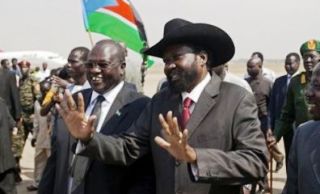Machar says he envisions South Sudan to become the “African tiger”
July 9, 2013 (JUBA) – South Sudan’s vice-president, Riek Machar, has expressed hopes and optimism that his two-year old founded nation will become “the African tiger” similar to the Asian tigers such as Singapore that surprisingly emerged from the scratch and became economic powers.

Machar who is an engineer by profession and obtained his PhD in Strategic Planning in Industry in Bradford University in England at the age of 30 years before joining the struggle for independence in early 1980s, said he could engineer a roadmap to the success of his country.
He expressed his mind about his vision for the country during separate exclusive interviews with the BBC Focus on Africa on Tuesday, July 9, 2013, in marking the 2nd anniversary of independence of his country, as well as with the widely listened to UN-sponsored Juba-based Miraya radio on the eve of the celebrations.
The vice-president said South Sudan has all it takes to become an economic hub in the center of Africa. He cited its untapped wealth of arable land for agriculture, oil, other minerals, livestock, water, forests as well as the human resource.
Commending the leadership for the successful attainment of independence from the former Sudan in July 2011, which he said deserves the celebrations Machar added there are however tough challenges that threaten to bring down the country into a failed state.
These, he enumerated, include rampant corruption, rising tribalism, dwindling economy, insecurity, poor international relations as well as the ruling party’s lost for vision and direction.
South Sudan was recently ranked as the 4th failed state in a global report among over 190 countries in the world, citing similar challenges Machar has been warning of to seriously tackle.
While blaming the situation on weak institutions he called for reform in the government’s institutions beginning with the party, announcing his intention to run for the chairmanship of the ruling party, the Sudan People’s Liberation Movement (SPLM).
He said he would then lead the rest of the transition to 2015 elections during which he will contest for the presidential driver’s seat, hoping that will make it possible for him to tackle the challenges successfully and meet the people’s expectations.
“We want to be a happy nation,” he said.
The vice-president has been selling his government’s plan to move the national capital to Ramciel and build one of the biggest world’s international airports in Tali, north of the current capital Juba.
Being the center of Africa he said the international airport would compensate for the country’s land-locked situation and become an international civil aviation hub taking advantage of its preferable location.
“Roads and electricity,” he said, are the top priorities as engines for the development delivery in South Sudan which should in turn move the rest of the development sectors to all the corners of the country.
He however said corruption and insecurity are a threat to tackle swiftly as they scare off he badly needed investment to the country, saying investor’s “capital is coward” and doesn’t come where there is corruption and insecurity.
On what seems to be an internal power wrangle within the ruling SPLM, Machar said it was always a healthy world-wide practice of democracy for a political party members and leaders to debate over issues and sustain self-criticisms and move on with renewed solutions.
The ruling party’s deputy chairman was referring to his bid to unseat his party chairman and president, Salva Kiir, in the next party national convention and in the 2015 presidential elections.
He said Kiir has had enough of his time as president as he will hit his ten years in office by 2015.
Machar said in order to avoid authoritarianism and dictatorship and rejuvenate the party and government and nourish democracy, a president should not go beyond ten years in office.
The vice-president however said the current internal frictions and debates in the ruling party are healthy and will finally be overcome, saying his decision to challenge Kiir was not a secret and should not in any way cause problems.
“I said it before the president; he knows it; it is not a secret; it shouldn’t cause a problem. We want to teach people the essence of democracy; the essence of renewal in party,” he said.
(ST)
